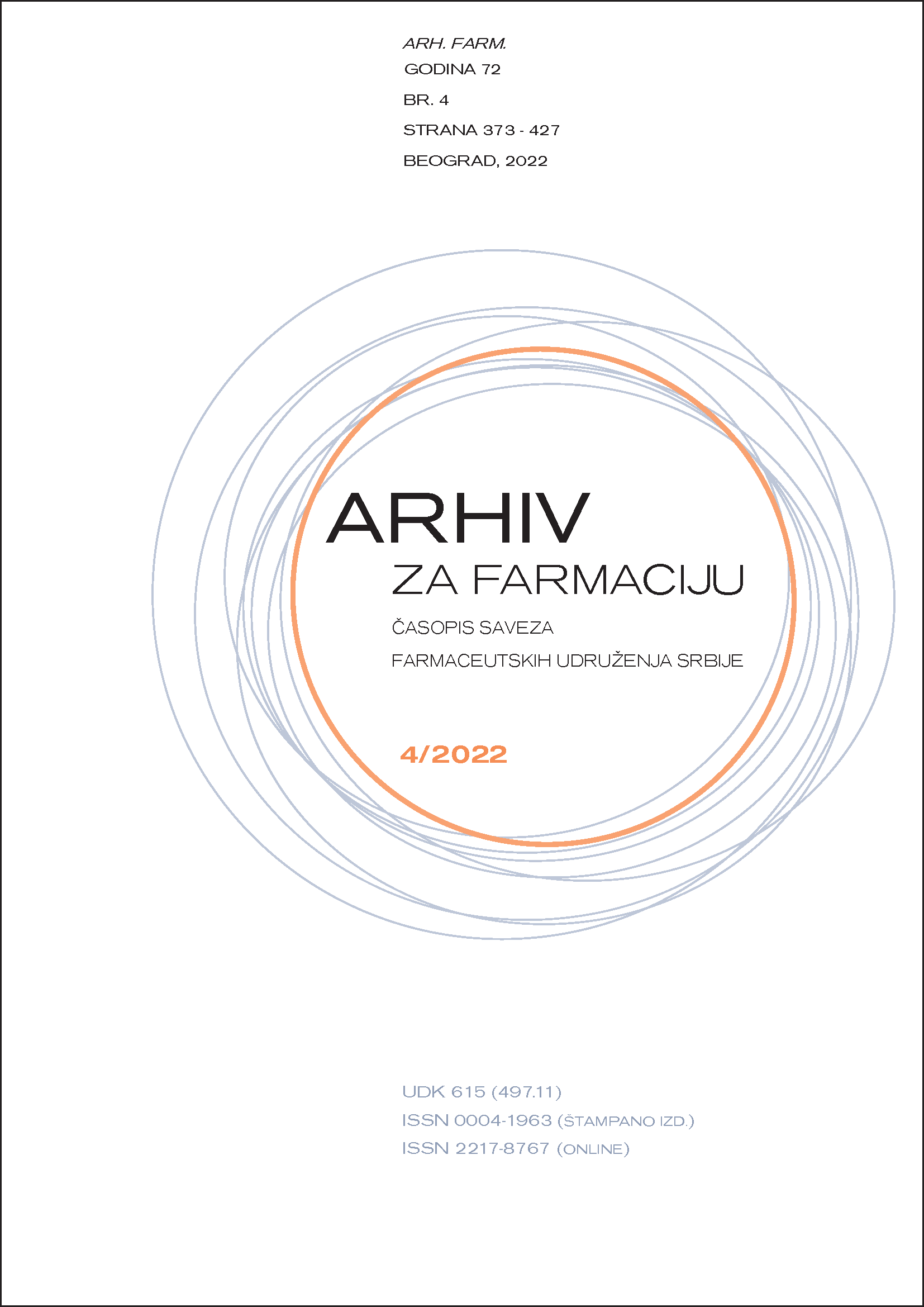Patients’ and psychiatrists’ stance on the current state of pharmacological depression treatment in Serbia and prospects of introduction of personalized pharmacotherapy and its potential effects
Abstract
The use of antidepressants has been steadily increasing. Even though the amount of evidence on the usefulness of personalized drug dosing in depression treatment is growing, there is still resistance and skepticism among physicians and regulators regarding the implementation of CYP450 genotyping and therapeutic drug monitoring in psychiatric clinical practice. The aim of this study was to quantify the opinions of psychiatrists and patients from three large psychiatric clinics in Belgrade, Serbia, and to examine what requirements need to be met to make changes in clinical guidelines or recommendations. All participants completed an anonymous questionnaire that was developed at the Faculty of Pharmacy, University of Belgrade. Fourteen practicing psychiatrists and 30 patients currently treated for depression completed the questionnaire. Distributions of opinion scores were compared between the psychiatrists and patients upon the visual inspection of the violin plots. Our results show that psychiatrists predominantly have a positive opinion on personalized dosing in psychiatry and that patients are most likely to comply with new approaches in depression pharmacotherapy. However, due to the long time needed for regulatory change, it is very unlikely that personalized dosing would be rapidly implemented in clinical practice, even if adequate evidence was to emerge.
References
GBD 2019 Diseases and Injuries Collaboration. Global burden of 369 diseases and injuries in 204 countries and territories, 1990-2019: a systematic analysis for the Global Burden of Disease Study 2019. Lancet. 2020;396(10258):1204-1222.
Sheehan DV, Keene MS, Eaddy M, Krulewicz S, Kraus JE, Carpenter DJ. Differences in medication adherence and healthcare resource utilization patterns: older versus newer antidepressant agents in patients with depression and/or anxiety disorders. CNS Drugs. 2008;22(11):963-73.
Maric NP, Stojiljkovic DJ, Pavlovic Z, Jasovic-Gamsic M. Factors influencing the choice of antidepressants: a study of antidepressant prescribing practice at University Psychiatric Clinic in Belgrade. Vojnosanit Pregl. 2012;69(4):308-13.
Himmerich H, Wranik DW. Choice of treatment with antidepressants: influencing factors. Curr Pharm Des. 2012;18(36):5958-75.
Rush AJ, Trivedi MH, Wisniewski SR, Nierenberg AA, Stewart JW, Warden D, et al. Acute and longer-term outcomes in depressed outpatients requiring one or several treatment steps: a STAR*D report. Am J Psychiatry. 2006;163(11):1905-17.
Serretti A. The Present and Future of Precision Medicine in Psychiatry: Focus on Clinical Psychopharmacology of Antidepressants. Clin Psychopharmacol Neurosci. 2018;16(1):1-6.
Hiemke C, Bergemann N, Clement HW, Conca A, Deckert J, Domschke K et al. Consensus Guidelines for Therapeutic Drug Monitoring in Neuropsychopharmacology: Update 2017. Pharmacopsychiatry. 2018;51(1-02):9-62.
Leucht S, Crippa A, Siafis S, Patel MX, Orsini N, Davis JM. Dose-Response Meta-Analysis of Antipsychotic Drugs for Acute Schizophrenia. Am J Psychiatry. 2020;177(4):342-53.
Furukawa TA, Cipriani A, Cowen PJ, Leucht S, Egger M, Salanti G. Optimal dose of selective serotonin reuptake inhibitors, venlafaxine, and mirtazapine in major depression: a systematic review and dose-response meta-analysis. Lancet Psychiatry. 2019;6(7):601-609.
Milosavljevic F, Bukvic N, Pavlovic Z, Miljevic C, Pesic V, Molden E, et al. Association of CYP2C19 and CYP2D6 Poor and Intermediate Metabolizer Status With Antidepressant and Antipsychotic Exposure: A Systematic Review and Meta-analysis. JAMA Psychiatry. 2021;78(3):270-80.
Hiemke C. Concentration-Effect Relationships of Psychoactive Drugs and the Problem to Calculate Therapeutic Reference Ranges. Ther Drug Monit. 2019;41(2):174-9.
Hiemke C. Consensus Guideline Based Therapeutic Drug Monitoring (TDM) in Psychiatry and Neurology. Curr Drug Deliv. 2016;13(3):353-361.
Divac N, Gasic MJ, Tosevski DL, Maric N, Stojanovic R, Todorovic Z, et al. Physician-Related Factors that Determine Clinical Decisions in Serbian Psychiatry. European Psychiatry. 2009;24(S1):1.
Jukic MM, Haslemo T, Molden E, Ingelman-Sundberg M. Impact of CYP2C19 Genotype on Escitalopram Exposure and Therapeutic Failure: A Retrospective Study Based on 2,087 Patients. Am J Psychiatry. 2018;175(5):463-70.
Jukic MM, Smith RL, Haslemo T, Molden E, Ingelman-Sundberg M. Effect of CYP2D6 genotype on exposure and efficacy of risperidone and aripiprazole: a retrospective, cohort study. Lancet Psychiatry. 2019;6(5):418-26.
Jokovic D, Milosavljevic F, Stojanovic Z, Supic G, Vojvodic D, Uzelac B, et al. CYP2C19 slow metabolizer phenotype is associated with lower antidepressant efficacy and tolerability. Psychiatry Res. 2022;312:114535.
Jakubovski E, Varigonda AL, Freemantle N, Taylor MJ, Bloch MH. Systematic review and meta-analysis: dose-response relationship of selective serotonin reuptake inhibitors in major depressive disorder. Am J Psychiatry. 2016;173:174–183.
Hodgson K, Tansey KE, Uher R, Dernovšek MZ, Mors O, Hauser J, et al. Exploring the role of drug-metabolising enzymes in antidepressant side effects. Psychopharmacology (Berl). 2015;232(14):2609-17.
Taranu A, Colle R, Gressier F, El Asmar K, Becquemont L, Corruble E, et al. Should a routine genotyping of CYP2D6 and CYP2C19 genetic polymorphisms be recommended to predict venlafaxine efficacy in depressed patients treated in psychiatric settings? Pharmacogenomics. 2017;18(7):639-650.
Caudle KE, Gammal RS, Whirl-Carrillo M, Hoffman JM, Relling MV, Klein TE. Evidence and resources to implement pharmacogenetic knowledge for precision medicine. Am J Health Syst Pharm. 2016;73(23):1977-1985.
Nacionalni vodič dobre kliničke prakse za dijagnostikovanje i lečenje depresije. Ministry of Health of the Republic of Serbia, 2013.
European Medicines Agency. Committee for Medicinal Products for Human Use (CHMP). Guideline on good pharmacogenomic practice. 2018.
Kühler TC, Bujar M, McAuslane N, Liberti L. To what degree are review outcomes aligned for new active substances (NASs) between the European Medicines Agency and the US Food and Drug Administration? A comparison based on publicly available information for NASs initially approved in the time period 2014 to 2016. BMJ Open. 2019;9(11):e028677.
Zanardi R, Prestifilippo D, Fabbri C, Colombo C, Maron E, Serretti A. Precision psychiatry in clinical practice. Int J Psychiatry Clin Pract. 2021;25(1):19-27.

